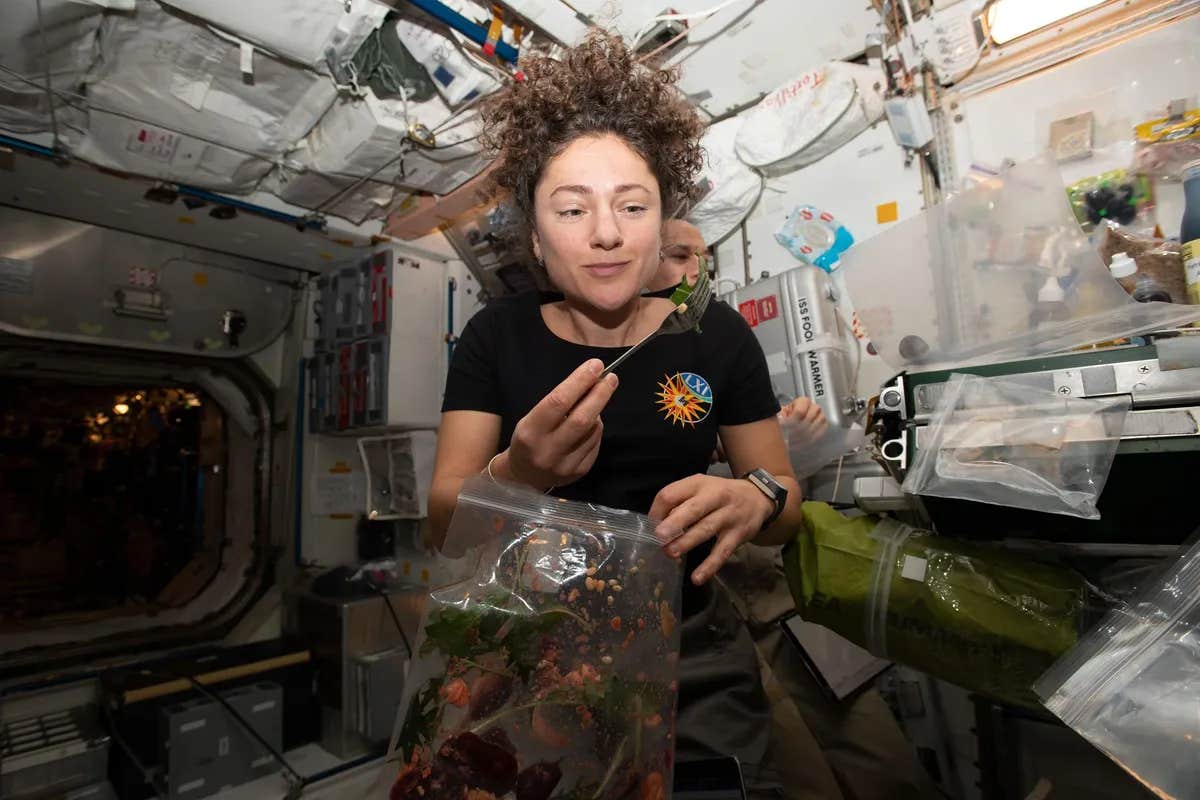Scientists design the ‘perfect’ meal to feed long-term space travelers
Researchers are pioneering the development of a nutritionally complete and calorically balanced “space salad” to sustain astronauts

[Jan. 3, 2024: JD Shavit, The Brighter Side of News]
Astronaut Jessica Meir enjoys some freshly harvested mizuna mustard greens on the International Space Station on Oct. 30, 2019. (CREDIT: NASA)
In a groundbreaking collaboration between the University of Adelaide, Australia, and the University of Nottingham, UK, a team of researchers is pioneering the development of a nutritionally complete and calorically balanced "space salad" to sustain astronauts on long-duration space missions.
Utilizing insights from a NASA study on daily dietary requirements for astronauts, the research team has embarked on a mission to create the ideal combination of plants to fuel spacefarers' bodies while addressing the unique challenges of space farming.
The "space salad" is a carefully curated blend of soybean, poppy, barley, kale, peanuts, sweet potato, and sunflower seeds, each ingredient meticulously measured to meet the nutritional needs of astronauts. The project, which falls under the umbrella of astropharmacy, farming, and food research, is led by Professor Volker Hessel, Research Director of the Andy Thomas Centre for Space Resources at the University of Adelaide.
Professor Hessel explains, "We have simulated a mix of six to eight crops that deliver all the required nutrients that an astronaut needs, which is different from what people need on Earth."
Related Stories
Unlike terrestrial diets, space salads must efficiently provide essential nutrients and calories in smaller portions, all while being cultivated in the confined quarters of a spacecraft.
The researchers began their journey by evaluating over a hundred different plant varieties. Their goal was to select plants capable of offering a nutritionally complete and calorically balanced plant-based diet, all within the constraints of limited space and resources.
To streamline the process, the team imposed strict criteria, such as using fewer than ten plant varieties, implementing space farming techniques like hydroponics, and minimizing the use of fertilizers to reduce payload.
This salad made up of soybeans, poppy seeds, barley, kale, peanuts, sweet potato and sunflower seeds could be the optimal meal for men on long-term space missions. (CREDIT: ACS Publication)
Professor Hessel emphasizes, "We have simulated a mix of six to eight crops that deliver all the required nutrients that an astronaut needs, which is different from what people need on Earth."
Beyond the nutritional aspects, the psychological well-being of astronauts was also a central concern for the research team. Factors like color, taste, texture, freshness, and flavor were carefully considered in crafting the space salad. Shu Liang, who led the research at the University of Nottingham's School of Biosciences, notes, "Food is such an integral part of staying healthy and happy, and there are many factors that contribute to this."
The food constraints considered were based on the recommendations of the National Aeronautics and Space Administration (NASA), considering up to 36 nutrients and 102 crops. (CREDIT: ACS Publication)
The researchers aim to create space farming systems and components that cater to the nutritional and psychological needs of astronauts during extended space missions.
To gauge the salad's impact on astronauts' mood and overall satisfaction, a "The Harmonic Psychology of a Space Salad" test was conducted. Four volunteers sampled the space salad, with one volunteer remarking, "wouldn't mind eating this all week as an astronaut."
Looking ahead, the research project's next phase involves the utilization of digital twin modeling to design growth chambers and systems capable of nurturing these crops in space. These innovations are essential steps toward enabling long-term space missions and ensuring that astronauts remain both physically and mentally fit for the challenges of space exploration.
In the quest for space salad perfection, these scientists are not only nurturing the bodies of future spacefarers but also nourishing their spirits, recognizing that a balanced, satisfying meal can be a source of comfort and connection in the vastness of space.
Note: Materials provided above by The Brighter Side of News. Content may be edited for style and length.
Like these kind of feel good stories? Get the Brighter Side of News' newsletter.
Joseph Shavit
Head Science News Writer | Communicating Innovation & Discovery
Based in Los Angeles, Joseph Shavit is an accomplished science journalist, head science news writer and co-founder at The Brighter Side of News, where he translates cutting-edge discoveries into compelling stories for a broad audience. With a strong background spanning science, business, product management, media leadership, and entrepreneurship, Joseph brings a unique perspective to science communication. His expertise allows him to uncover the intersection of technological advancements and market potential, shedding light on how groundbreaking research evolves into transformative products and industries.



